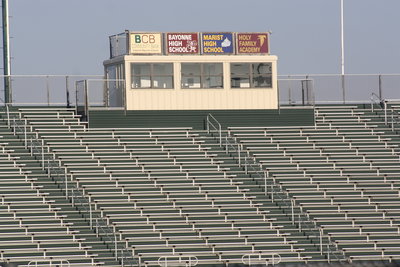Hoping to use $1.1 million dollars acquired as a result of negotiation with Spectra Energy, the city has expressed a desire to begin the process of upgrading the Don Ahern Veteran’s Sports Complex. The stadium was constructed in the mid-1960s and needs significant modernization.
It is an 11-acre facility that includes a football stadium, baseball field, soccer field, track, playground, and wading pool.
At its Feb. 20 meeting, the City Council is expected to approve a measure that would allow the city to enter into an agreement with Maser Consulting of Mount Arlington for professional engineering, design, and construction administrative services in refurbishing the playing surface at the stadium for a fee of $245,050.
Although the agreement with Spectra Energy will cover the cost of this, Business Administrator Steve Gallo said dealing with the numerous issues thereafter will require a significant investment of additional resources.
“The money we received from Spectra is a good start,” he said. “But we’re going to need to identify other revenue sources in the future.”
The stadium has a number of issues, including drainage, and the city is looking to changing to a turf surface in the playing areas, improving the lighting system, and upgrading the locker facilities and concession stand, Gallo said.
“We want this to have no impact on the taxpayers,” Gallo said.
He said he hopes work can be scheduled for after the end of sports seasons and be completed by the time new seasons starts.
“We hope to start at the end of the football season later this year and have the facility ready next year,” Gallo said. “We intend to work around the existing sports schedules and cause no disruptions.”
Low-lying areas of the complex are prone to flooding and other water-related issues and that part of the project would be to upgrade the drainage system.
With the improvements, Gallo said, the city hopes to expand uses at the facility.
“The money we received from Spectra is a good start.” – Steve Gallo__________
Funding needed, but gas line brings benefits
When interviewed, Gallo said, the city will be seeking out funding sources that will pay for the project, and that the engineering study is designed to give the city an overall idea of how much the project will cost.
Councilman Ray Greaves said the improvement are very welcome and much needed, and praised Spectra Energy for the financial boost that will allow the city to pursue this long-needed project.
Gallo said this money is on top of the $2.3 million the city will receive annually from the gas line project in taxes.
“We got everything we wanted from them,” Gallo said. “When we asked them to relocate their gas line into industrial areas, they did. The gas line will have no impact on residential areas and the city benefits financially from it.”
Unlike some of the other communities through which Spectra Energy is running its natural gas line, Bayonne officials asked for and received concessions from the company that included changes in the proposed route. This resulted in more than $2.3 million in annual revenue to the city, as well as other perks.
The city will receive $1.1 million as a direct payment; $500,000 in payments for easements right away for the line; and $15,000 a month for additional leases.
The biggest change, however, was the moving of the proposed pipeline route out of residential areas, placing the west-to-east route under the Kill Van Kull instead at the southernmost tip of Bayonne near Staten Island.
Gallo said the city had concerns early on about the project, but the council had sat down to work out some of the issues, most of which involved the proposed route of the project that would have taken the line through residential neighborhoods.
Company officials, Gallo said, agreed to relocate that portion of the line to the bottom of the Kill Van Kull, which will bring the line from west to east and make landfall again in the industrial portion of eastern Bayonne.
The line will run out of Staten Island into Bayonne, then up into Jersey City near Hoboken, before turning east to access Manhattan.
Gallo said federal approval for the project made opposition to it futile, although the city had already obtained the necessary concessions from Spectra and dropped opposition prior to the federal approval.
Gallo said that the technical improvement and the extensive monitoring of the line would assure people’s safety.
